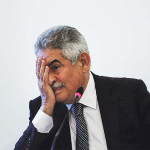Government creates steering group for BES and Banif victims
A steering group is to be set up by the government to look into the millions of losses suffered by bank customers who bought commercial paper in troubled banks Banco Espírito Santo and Banif before they collapsed eight years ago.
In the case of BES, many of those who bought into what amounted to high risk financial products were pensioners and people with little or no understanding of the financial risks they were taking, believing they were investing in low-risk bonds with little chance of anything going wrong. Some lost their entire life savings.
The steering group will start work in September analysing the situation of some of the customers who suffered losses with products ‘BES (2014)’ and ‘Banif (2016)’, as had been promised by the Prime Minister António Costa on 10 June.
The focus will be on customers who are non-residents of mainland Portugal, looking into the cases of those living in the Autonomous Regions Madeira and the Azores and South Africa and Venezuela.
“As has been communicated by the Prime Minister, the government is in favour of setting up a steering group to look into the losses suffered by BES and Banif products, particularly those residents in the autonomous regions, South Africa and Venezuela,” said a statement issued by the Ministry of Finance on Friday.
The ministry said it would also work with the Bank of Portugal and the Portuguese securities and stock market commission CMVM and the bank’s customer associations such as ALEVE, ABESD and ALBOA.
The losses affect small and inexperienced investors who lost around €180 million which have been trying to find a way to get back their money ever since the two banks collapsed.
The plan is to set up a government-backed Credit Recovery Fund with the CMVM. In the past the government had already tried to set up a commission to investigate specific situations in which possible illegal practices may have been used in selling BES and Banif products”.
In addition to the steering group, the government has asked the central bank to carry out an analysis on the “expectations to recover the credit in question”.
In 2020, a programme in which 4,357 BES investors who had lost their money and who were repaid in instalments was concluded. The State gave a €153 million in guarantee so that the fund could repay the investments with the expectation that there is recoverable money so that the guarantee can be repaid.










